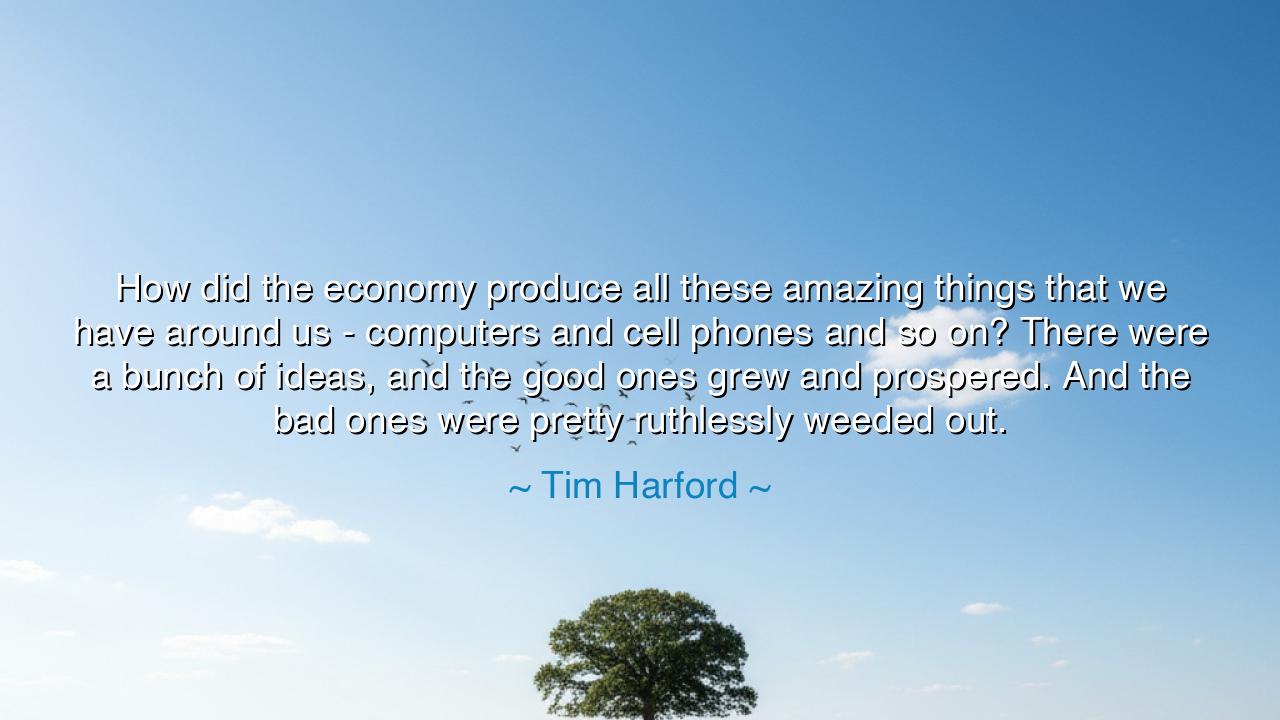
How did the economy produce all these amazing things that we have
How did the economy produce all these amazing things that we have around us - computers and cell phones and so on? There were a bunch of ideas, and the good ones grew and prospered. And the bad ones were pretty ruthlessly weeded out.






“How did the economy produce all these amazing things that we have around us — computers and cell phones and so on? There were a bunch of ideas, and the good ones grew and prospered. And the bad ones were pretty ruthlessly weeded out.” Thus spoke Tim Harford, the modern sage of economics, whose wisdom is wrapped not in equations but in the living rhythm of human progress. Beneath his practical words lies a timeless truth — that the world, in its wonders and creations, advances not by perfection but by evolution, through trial, error, and renewal. His words are not merely about the economy, but about life itself — for the story of human prosperity is the story of the mind learning to grow through failure.
In the ancient days, this principle was known by another name: natural selection. The philosophers of Greece and the scientists of later centuries saw in the order of nature a pattern — the strong survive, the adaptable endure, and the rigid perish. Harford reminds us that this law does not belong only to the forest or the sea, but to every field of human endeavor. The economy, he says, is a living organism made not of blood, but of ideas. Some are born brilliant, others flawed; some thrive in the light of use, others crumble in the shadow of irrelevance. Just as in the wild, only those that serve and sustain endure.
Look around you, and you will see the truth of his words. The computer, once the size of a room, was reduced to the palm of a hand by countless minds refining, experimenting, discarding. The cell phone, once a symbol of wealth, now rests in every pocket — a monument to generations of invention, each one built upon the ashes of what came before. This is the power of creative destruction, the fire that consumes the old to make room for the new. Harford’s insight is not cold analysis but reverence for the strange, ruthless beauty of progress — a beauty born of struggle.
Consider the story of Thomas Edison, the wizard of Menlo Park, who tested thousands of filaments before finding the one that would glow without burning. When asked how he endured so many failures, he replied, “I have not failed. I’ve just found 10,000 ways that won’t work.” Edison’s lamp, like the modern world itself, was not the product of genius alone, but of persistence guided by nature’s ancient law: the weeding out of the unfit. It is this same principle that shapes economies, societies, and souls.
Yet, Harford’s words are not merely a hymn to success — they carry a warning. For in saying that the bad ideas are “ruthlessly weeded out,” he reminds us that progress is not gentle. The same forces that lift the worthy will cast aside the weak. Innovation demands courage, not comfort. To live in such a world, one must learn resilience — the art of failing without surrender. Those who cling to the past, who fear the pruning of change, will find themselves overgrown and forgotten. But those who learn, adapt, and plant new seeds will rise with the next dawn.
And so, his teaching becomes not just economic, but moral. The wise must learn to see failure as fertility, not as shame. The fall of a bad idea makes room for a better one. The collapse of an old order prepares the soil for a new beginning. Even in our own lives, this law holds true: every dream that falters, every plan that dies, clears space for something truer to take root. The great harvest of human progress depends upon the courage to try, to fail, and to begin again.
Thus, let us take heed of Harford’s insight and carry it as both comfort and challenge. Do not fear the ruthless weeding — fear only the stagnation that comes from never planting. Be willing to release what no longer serves, and to nurture what may yet grow. The same wisdom that governs economies governs the soul: that through the cycle of creation and destruction, of birth and decay, life renews itself eternally.
So, O seeker of wisdom, remember: the world thrives not because it avoids failure, but because it learns from it. The economy of ideas, like the garden of life, demands both patience and pruning. Rejoice, then, in the ceaseless flowering of thought, and when your own ideas are tested by fire, do not despair — for you are part of the great experiment of humanity, ever striving, ever renewing, ever reaching toward the light.






AAdministratorAdministrator
Welcome, honored guests. Please leave a comment, we will respond soon